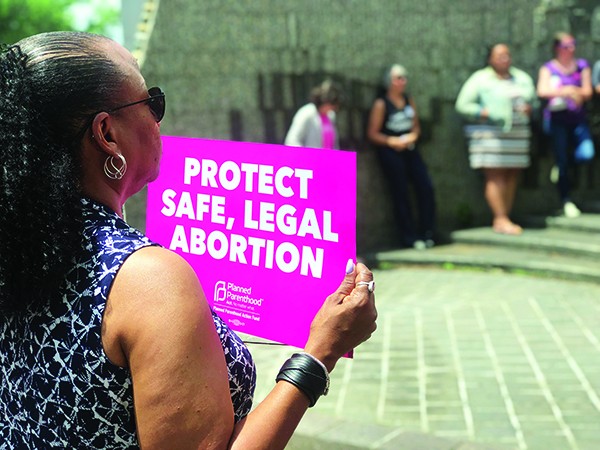Tennessee came close to being the 17th state to pass legislation this year either placing greater restrictions on abortion or effectively banning the procedure completely.
About 40 pro-choice advocates rallied here last week against those recently passed bans.
Ashley Coffield, president of Planned Parenthood for the Greater Memphis Region, said last week that 73 percent of Americans oppose banning abortion, and “we’re out here today to raise up their voices and tell the nation that we won’t stand for it.

City Hall last week.
“In Tennessee, we have Planned Parenthood and other organizations that offer abortion, and that’s a great thing,” Coffield said. “But we are under attack from our legislature right now. It’s worse than it’s ever been.”
Coffield said the Tennessee legislature was close to passing an outright abortion ban this year, but that measure failed in the state Senate. That legislation is slated to be discussed during the legislation’s summer session, meaning it could return next year.
Tennessee did, however, pass a law that would criminalize abortion in the state if the U.S. Supreme Court’s 1973 Roe v. Wade decision is overturned. That law, the Human Life Protection Act, would ban abortions except “when an abortion is necessary to prevent death” or “substantial and irreversible impairment of major bodily function.”
If Roe v. Wade is overturned, the law would make it a felony offense for doctors to perform abortions. Under the law, women seeking abortions would not be prosecuted.
“The fight is far from over in Tennessee,” Coffield said. “Our rights are at risk like they’ve never been before and this is a coordinated attack nationwide to get a case to the Supreme Court to overturn Roe v. Wade.”
Coffield said abortion is basic health care for women and making abortion illegal won’t stop abortions: “Abortion will just be unsafe, and women will die.”
Currently, in Tennessee abortion is legal throughout the first 20 weeks of a woman’s pregnancy. However, the law places restrictions and regulations on clinics that offer abortion and women seeking the procedure, according to Holly Calvasina, director of development and communications for Choices.
One of those regulations is the 48-hour waiting period, Calvasina said. Women seeking an abortion must make an appointment to see a physician on two different occasions at least 48 hours apart. According to the law, this is to “reduce coerced abortions and to allow time to carefully consider the information and resources provided by informed consent provisions.”
Calvasina said this makes abortions more expensive because women must pay for two doctor’s visits.
Shelby County Commissioner Tami Sawyer, who sits on the Planned Parenthood board here, was also at the rally last week, speaking against abortion bans.
“It was more important for me to be here with you on the ground to say ‘this won’t fly for us,'” Sawyer said. “I know personally what it means to be able to make decisions about your body. No one should be able to tell anyone what they can do with their life and their future.”